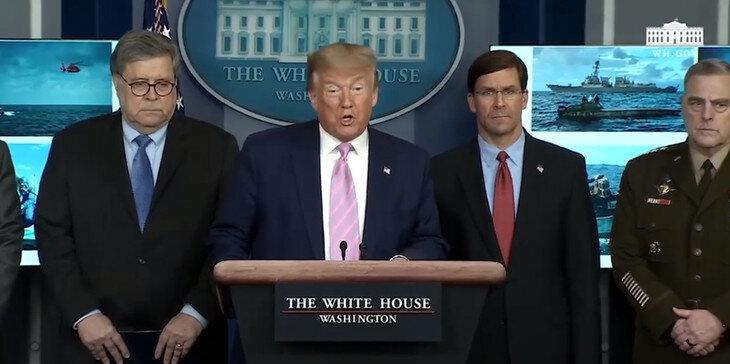While the nation is bracing for what government officials and advisers call the most devastating period of the coronavirus pandemic, the military was catapulted into the narrative this week with a series of contentious actions and declarations.
On April 1, President Trump began his daily press briefing by filling the small stage with military brass and addressing the public with a barrage of militaristic lingo. The president said, “America continues to wage all-out war to defeat the virus…we’re attacking the virus on every front… every American will do their patriotic duty and help us to achieve a total victory.”
The entourage proceeded to announce a new narco-terrorism operation that falls under the Area of Responsibility of the United States Southern Command, SOUTHCOM. These responsibilities include providing contingency planning, operations, and security cooperation for Department of Defense operations conducted in Central and South America.
The president said, “In cooperation with the 22 partner nations, U.S. Southern Command will increase surveillance, disruption, and seizures of drug shipments and provide additional support for eradication efforts which are going on right now at a record pace.”
“We’re deploying additional Navy destroyers, combat ships, aircraft, and helicopters; Coast Guard cutters; and Air Force surveillance aircraft, doubling our capabilities in the region.”
This comes a day after Santa Rosa local Captain Brett Crozier wrote a memo requesting assistance as the ship he captained, the USS Theodore Roosevelt, was experiencing an outbreak of COVID-19 and he was concerned for the safety of sailors on board.
Capt. Crozier requested permission to dock the ship in Guam, maintain operations with a limited crew, and quarantine the majority of personnel on land. He wrote, “We are not at war. Sailors do not need to die. If we do not act now, we are failing to properly take care of our most trusted asset — our Sailors.”
The letter was anonymously leaked to the San Francisco Chronicle and published on March 31.
Defense Secretary Mark Esper said he “didn’t have time to read the letter in detail”, and the president downplayed the memo by describing it as “terrible” and “all over the place.”
When questioned about how the Navy would respond to the situation, Chief of Naval Operations Admiral Michael Gilday initially said, “We’re not going to shoot the messenger,” but a day later Capt. Crozier was relieved from duty on Thursday, April 2.
Capt. Crozier is lambasted by senior officials for not following the chain of command, however, acting U.S. Navy Secretary Thomas Modly bypassed the chain of command protocols by firing Crozier in an act attributed to retaliatory retribution by a number of active military members and elected representatives.
Videos posted online show sailors aboard the vessel showering Capt. Crozier with praise in a hero’s farewell as he left the ship after being relieved of duty. Shouts of “Captain Crozier” can be heard from throughout the crowd, and the visibly emotive response illustrates the widespread respect the crew has for their commanding officer.
At the same time that the Navy was dealing with the situation on the Roosevelt, the president tweeted, “Upon information and belief, Iran or its proxies are planning a sneak attack on U.S. troops and/or assets in Iraq. If this happens, Iran will pay a very heavy price, indeed!”
The drums of war are beating hard during the coronavirus crisis, and the announcement of an enhanced narco-terrorism operation focused on Venezuela is the newest approach to force regime change by any means necessary. Successive administrations have openly called for the need to replace the leadership, and Maduro’s regime narrowly avoided multiple coup attempts in recent years.
Venezuela is a highly desirable asset in that as of 2016 it has more proven oil reserves than any nation on the planet, and it accounts for nearly one-fifth of the total.
The Orinoco Arc and other areas within the nation are especially rich in gold ore and valuable deposits. While the people of Venezuela are struggling under crippling conditions, the nation is immensely wealthy in terms of natural resources.
At the briefing, the highest-ranking officer in the military, Chairman of the Joint Chiefs of Staff General Mark A. Milley, said, “We’re at war with COVID-19, we’re at war with terrorists, and we are at war with the drug cartels as well.”
The Navy is focusing efforts on sea routes from Colombia and Venezuela to the United States. On March 26, the Department of Justice indicted Venezuelan President Nicolas Maduro and 14 current and former officials on charges of participating in a narco-terrorism conspiracy, conspiring to import cocaine into the United States, using and carrying machine guns and destructive devices during and in relation to the conspiracies, and corruption.
The State Department is offering a $15 million reward for information leading to Maduro’s arrest. U.S. National Security Advisor Robert C. O’Brien announced at the briefing that “drug trafficking…provides the corrupt Maduro regime in Venezuela and other bad actors with the funds necessary to conduct their malign activities.”
The National Security Archive hosted by George Washington University contains documents that illustrate the hypocrisy of this accusation.
In 1987, the Senate Subcommittee on Narcotics, Terrorism, and International Operations investigated the claim that illicit drug money was diverted by special operations units and intelligence agencies to fund a proxy war against Nicaragua’s Sandanista government.
After extensive investigations, John Kerry’s report noted that “senior U.S. policymakers were not immune to the idea that drug money was a perfect solution to…funding problems.”
Gary Webb wrote a series of comprehensive articles, “The Dark Alliance”, for the San Jose Mercury News in 1996 alleging that crack cocaine was initially brought to California by guerrilla Contra forces aligned with the Reagan administration.
Declassified documents, hand-written notebooks, emails, memos, FBI and DEA reports, as well as official court and hearing transcripts reveal that high-ranking members of the U.S. government had knowledge of drug trafficking and the Contras.





![[Both photos courtesy of sonoma.edu]
Ming-Ting Mike Lee stepped in as the new SSU president following Sakakis resignation in July 2022](https://sonomastatestar.com/wp-content/uploads/2024/04/CC4520AB-22A7-41B2-9F6F-2A2D5F76A28C-1200x1200.jpeg)


























